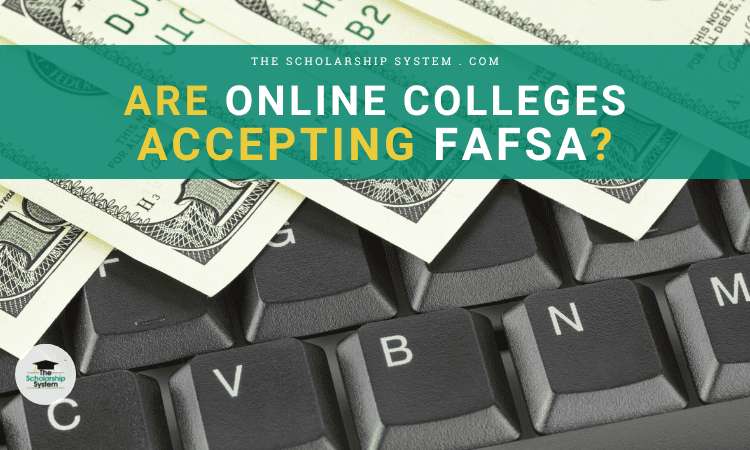Updated on August 3rd, 2022
Many students assume that all colleges are the same, particularly when it comes to financial aid. However, that isn’t actually the case, particularly if a student is focused on online schools. In reality, the list of online colleges accepting FAFSA is a bit more limited than traditional brick-and-mortar universities. Since that’s the case, students who enroll at specific online colleges may get a surprisingly large bill.
Did you know that many online colleges also accept scholarships? It’s true. If you and your student want to learn about scholarship opportunities, sign up for our free college scholarship webinar! Take a quick trip over to http://thescholarshipsystem.com/freewebinar to reserve a spot today.
Fortunately, by learning which online colleges are accepting FAFSA, students can make sure they’ll get the financial aid they need. Plus, it may incidentally help them determine which online schools offer a higher-quality education.
If your student is looking for online schools that accept FAFSA, here’s what they need to know.
Contents
Does FAFSA Cover Online College?
Whether financial aid through a FAFSA covers online college depends mainly on the school’s accreditation. In most cases, regionally accredited online schools will accept the FAFSA without hesitation. With nationally accredited schools, whether they welcome the FAFSA can vary, as some may do so while others don’t.
However, the FAFSA won’t cover costs associated with degrees from non-accredited schools. This is true regardless of whether the degree is earned online or by attending colleges in person. The lack of accreditation makes the college FAFSA ineligible.
Online Colleges Accepting FAFSA
The number of online colleges accepting FAFSA is actually incredibly large. Mainly, this is because two types of institutions may fall on this list.
First, you’ll have online-only accredited schools. Second, some of the accredited online colleges that accept FAFSA are online divisions of traditional brick-and-mortar universities.
Both segments have actually grown significantly recently. Along with advancing technology, interest in online-only education has increased dramatically. It provides learners with more flexibility, something that’s particularly critical for students who want to study while working full-time.
As a result, along with a boom in online-only colleges, many traditional brick-and-mortar schools looked to capitalize on the trend. It was a simple way to expand enrollment while keeping costs down. Plus, it allows them to connect with talented students who may not be able to relocate or that require a non-traditional approach to a college education.
Here is a list of online colleges that accept FAFSA:
- American Public University
- Baker College
- Capella University
- Grand Canyon University
- Penn State World Campus
- Purdue University Online
- Southern New Hampshire University
- University of Florida Online
- University of Phoenix Online
- Western Governors University
It’s important to note that this list isn’t all-inclusive. Instead, it simply covers some of the more popular online colleges that take FAFSA.
As mentioned above, many colleges and universities that aren’t online-focused also have online degree programs that accept FAFSA. The number of programs that fall in this category is simply too large to list, which is why only some of the top options in this group are included above.
Ultimately, students may be able to attend a variety of schools that accept FAFSA remotely, even if online degrees aren’t the bulk of what the college offers. Since that’s the case, students shouldn’t necessarily focus on online-only schools alone. Instead, they should see if other universities that may interest them offer fully online degrees, as the results may surprise them.
Online Colleges That Don’t Accept FAFSA
While many online colleges do accept FAFSA, there is also a large number that don’t. In most cases, the schools that fall in this group either aren’t accredited, making them ineligible for federal financial aid. Some are also nationally accredited and while they have accreditation, accepting the FAFSA isn’t as common as it is with regionally accredited colleges.
Here is a list of online colleges that don’t accept FAFSA:
- Ashworth College
- Atlantic International University
- Columbus University
- Hill University
- Penn Foster
Like the list of collects that accept FAFSA, this list isn’t all-inclusive. It simply includes some of the more popular online colleges where students can’t use traditional financial aid.
How to Find Out Whether an Online College Accepts FAFSA
Now that your student knows the answer to the question, “Can you get FAFSA for online classes?” they’re likely wondering how they can figure out if the school they’re interested in is one of the FAFSA-approved colleges. Fortunately, it isn’t as difficult as it may seem. Here are several ways students can get the answers they need.
Check the College’s Website
Generally speaking, online universities that accept FAFSA will openly state that they do. That information is typically listed on the Admissions or Financial Aid pages of the college’s website, making it reasonably easy to find.
However, even if your student doesn’t see anything explicitly mentioning the FAFSA, there are other ways to figure it out.
Look for a FAFSA School Code
When students complete their FAFSA, they can conduct a school code search. Those codes allow students to submit their information to colleges for consideration. If a school has a FAFSA code, it can typically accept FAFSA-related financial aid.
Check the College’s Accreditation
Another way to determine the school’s status is to look at its accreditation. Non-accredited colleges aren’t FAFSA-eligible, so students would have to use other funds to cover the cost. Similarly, many nationally-accredited online colleges won’t accept the FAFSA.
With regionally accredited colleges, FAFSA acceptance is the norm. Since that’s the case, those are usually the best option for students who want to use federal financial aid for their online education. In this case, students will usually see a FAFSA school code for those institutions, which is why using that approach is often the simplest.
Students have several options for finding out about a school’s accreditation, or lack thereof. Along with searching the college’s website, students can check the US Department of Education’s database to quickly find out.
Ask the College Directly
Finally, students can simply ask the admissions department whether the college is FAFSA-eligible. This is a solid choice for students who are still in the middle of a college decision. This allows them to find out if a school is a reasonable option before they’ve even completed their FAFSA, so students should feel free to go this route if needed.
With this, students should either call or email the admissions or financial aid department. In most cases, a call is the better approach if your student needs a quick answer, as the best online colleges that accept FAFSA are often reasonably easy to reach. However, if your student can afford to wait, they can certainly send an email instead, allowing them to get an official response in writing.
What to Do If an Online College Doesn’t Accept the FAFSA
While students can attend colleges that don’t accept the FAFSA, it isn’t always the best choice. Many of the schools that fall in this category aren’t accredited, and a lack of accreditation could signal a lower-quality experience. Transferring to another college is often quite tricky, too, as many schools won’t accept credits from non-accredited institutions. Finally, employers don’t typically look positively on degrees from non-accredited schools, which could harm their careers.
If the school is nationally accredited but doesn’t accept the FAFSA, some of the issues above remain. For instance, many colleges won’t take transfer credits from nationally accredited schools. Often, this is because the educational standard falls below what you typically see with regionally accredited institutions. Employers may also not give degrees from those colleges the same weight, which could hinder a student’s career.
If your student insists on going another direction and they’re comfortable with the risk, they could still attend using other types of financial aid. Some scholarships may work at nationally accredited schools. Private student loans might be an option for nationally accredited colleges and unaccredited institutions, depending on the lender.
Still, students should typically focus on regionally accredited online schools. Along with accepting the FAFSA, these degrees are generally more valuable from a career perspective, allowing your student to get the most out of their education.
Did you know that many online colleges also accept scholarships? It’s true. If you and your student want to learn about scholarship opportunities, sign up for our free college scholarship webinar! Take a quick trip over to http://thescholarshipsystem.com/freewebinar to reserve a spot today.








Leave a Reply